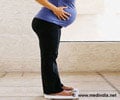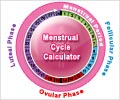Postpartum depression after
childbirth is common and affects 10 to 18 percent of all new mothers. Medindia offers a postpartum screening tool to help assess the risk of postpartum depression.
What is Postpartum Depression
The National Institute of Mental Health describes postpartum depression as a mood disorder that can affect women after childbirth explaining, "Mothers with postpartum depression experience feelings of extreme sadness, anxiety , and exhaustion that may make it difficult for them to complete daily care activities for themselves or others." It usually appears within four weeks of childbirth and can last weeks, several months or up to a year.
Postpartum depression can be harmful to both mother and child. There have been cases in the US and UK where mothers struggling with depression, have tragically killed or harmed their children. If you believe that you are experiencing postpartum depression, it�s important to consult a psychiatrist or speak to your Gynaecologist to start the treatment.
Symptoms of Postpartum Depression
The symptoms of postpartum depression develop 2 weeks after childbirth. The symptoms include (1✔)
- Persistent sad, anxious or empty feelings most of the day
- Feeling hopeless or negative thinking
- Irritability, frustration or restless
- Loss of interest in hobbies and activities
- Fatigue or lack of energy
- Sleeping difficulty or oversleeping
- Appetite changes or unplanned weight loss
- Trouble bonding or forming an emotional attachment with the baby
- Constant doubts about the ability to care for the baby
- Suicidal thoughts or thoughts of harming the baby
Is Postpartum Depression and Baby Blues the Same?
Postpartum depression and
baby blues are often confused but they are distinct conditions with key differences. Postpartum depression is a more severe and long-lasting form of
depression that affects about 10-15% of mothers. Postpartum depression includes persistent sadness, difficulty bonding with the baby and even
self-harm in severe cases.
In contrast, Baby blues are a temporary emotional state affecting up to 80% of new mothers. It is characterized by
mood swings , tearfulness and fatigue which begins a few days after delivery and resolves within two weeks without medical intervention. While baby blues are mild and short-lived, postpartum depression significantly interferes with daily life and requires professional treatment. Recognizing these differences is crucial for timely support and care (
2✔).
Causes of Postpartum Depression
The cause of postpartum depression or depression after childbirth is still unknown. The symptoms may appear due to a significant drop in estrogen levels after birth. But the potential causes can be (3✔)
Treatment of Postpartum Depression
Treatment for postpartum depression focuses on addressing emotional, physical and social factors to restore a sense of balance and well-being. The following are treatment options available for treating postpartum depression:
Psychotherapy
Counseling or therapy sessions with mental health professionals can help in understanding and coping with emotions and challengesSupport groups where other postpartum depression mothers are involved can help them understand themselves.
Self-care
It is important to take care of yourself. Try to get enough
sleep, eat
balanced food be physically active and ask help when needed.Contact family, friends or others you trust who can provide advice or support.
Medication
Sometimes medication can be prescribed to help manage symptoms. Commonly antidepressants are prescribed to help relieve symptoms of depression and certain medications can be taken during breastfeeding.
Brexanolone is an FDA-approved medicine used to treat postpartum depression in adult women. This is given through the intravenous (IV) route.
Zuranolone is the first oral medication approved to treat postpartum depression. With timely intervention, most individuals can fully recover,
improving their quality of life and fostering a healthy bond with their children (
4✔).
FAQs
1. Do fathers experience postpartum depression?
Yes, fathers experience postpartum depression, too. Around 10% of new fathers show signs of depression, particularly if the mother has postpartum depression. Sleep deprivation, stress, and changes in family dynamics contribute to paternal postpartum depression (5✔).
2. How long does postpartum depression last?
Postpartum depression can last anywhere from a few weeks to several months. If left untreated, it may persist longer. With appropriate treatment, most women start to feel better within a few months (6✔).
3. Does breastfeeding affect postpartum depression?
Breastfeeding can have both positive and negative effects on postpartum depression. The release of oxytocin during breastfeeding can help reduce stress and improve mood. However, challenges such as painful breastfeeding, low milk supply, or breastfeeding-related anxiety can worsen symptoms of depression for some mothers (7✔).
4. Do women experience postpartum depression after stillbirth?
Yes, women can experience postpartum depression after a stillbirth. The grief, emotional trauma and hormonal changes following stillbirth can lead to symptoms of depression similar to those experienced after a live birth. Along with the loss of the baby, mothers may face feelings of guilt, sadness, anger and a deep sense of loss, which can be intensified by physical recovery from childbirth. It is important for women who experience a stillbirth to seek support as postpartum depression and complicated grief are common following child loss (8✔).
5. Does medication affect or worsen postpartum depression?
Some medications, particularly birth control or antihypertensive drugs have side effects that can worsen depressive symptoms. It is important to discuss any new medications with the doctor, especially during the postpartum period, to ensure they won't interfere with mental health (9✔).
6. Does postpartum depression only affect first-time parents?
Postpartum depression affects all parents, not just first-time parents. It is commonly associated with the challenges of having a first child, hormonal changes, sleep deprivation, stress and a history of depression that can trigger postpartum depression in any pregnancy. Parents who have experienced postpartum depression are at higher risk of experiencing it again (10✔).
7. How can I support a loved one who is experiencing postpartum depression?
To support a loved one experiencing postpartum depression, offer a compassionate, non-judgmental ear and encourage them to seek professional help. Be patient and understanding, and validate their feelings. Take over household tasks or care for the baby and allow them time to rest and recharge. Your ongoing support, patience, and understanding can be instrumental in their recovery (11✔).

 Email
Email









